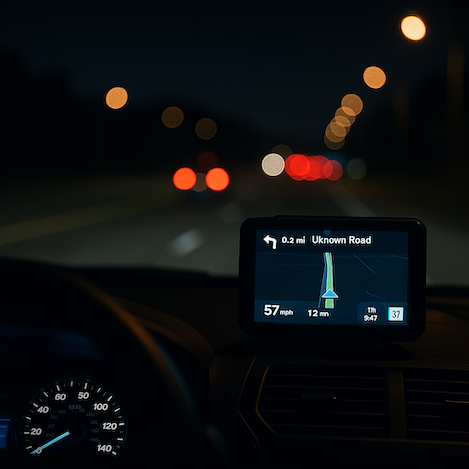When GPS Causes a Crash: Can Technology Be to Blame?

Every day, drivers across Maine depend on GPS navigation to guide them from one destination to another. Apps like Google Maps, Apple Maps, and Waze promise the fastest, most efficient routes — but when that technology fails, the results can be devastating.
Too often, drivers follow GPS directions straight into danger — turning the wrong way, entering closed roads, or driving into water or construction zones. These crashes raise an important question: when GPS directions cause a wreck, who’s really to blame — the driver or the technology?
How GPS Errors Lead to Crashes
Modern navigation apps constantly update routes, but they still make mistakes. When a driver follows those directions without paying attention to the road, tragedy can strike.
In 2024, a visitor to coastal Maine drove her car into Casco Bay after her GPS instructed her to “continue straight” down a dark, foggy road. In another case, a delivery driver in New Hampshire followed his GPS across a closed bridge, ending up in a river.
These crashes happen because drivers trust the device more than their instincts. They ignore warning signs, detour barricades, or road conditions because “the GPS said so.” In doing so, they turn a helpful tool into a dangerous distraction.
Can GPS Companies Be Held Responsible?
In most cases, courts place responsibility on the driver, not the GPS company. Navigation apps protect themselves with broad disclaimers buried in their user agreements — statements that say drivers use the service “at their own risk.”
That doesn’t mean GPS companies are untouchable. In rare cases, they may share liability if their product directly causes harm, such as when:
- The app provides grossly inaccurate or outdated data;
- The company ignores reports of dangerous routing errors; or
- The app fails to warn drivers of known closures or hazards.
For example, if a GPS app repeatedly routes drivers onto a closed cliffside road and the company refuses to fix the error, an attorney could argue that the developer acted negligently. However, proving that link is challenging. Courts typically rule that drivers have the final responsibility to obey road signs and drive safely.
Drivers Have a Duty to Stay Alert
No matter what technology says, Maine law requires drivers to maintain control of their vehicles and follow all traffic laws. That means keeping their eyes on the road — not the screen.
When a driver crashes because they followed GPS directions into oncoming traffic, a dead end, or a ditch, investigators often cite driver inattention or distraction as the cause. The GPS might have provided the wrong route, but the driver chose to ignore visible warning signs.
Experts estimate that one in four GPS-related crashes involves distracted driving. A quick glance at a phone screen or map update is enough to cause a head-on collision or rollover, especially on Maine’s narrow, rural highways.
Simply put: technology can assist, but it can’t replace judgment.
What Victims Can Do After a GPS-Related Crash
If another driver’s overreliance on GPS causes an accident, victims can file a personal injury claim to recover damages. The at-fault driver — not the GPS company — typically bears liability.
Victims can seek compensation for:
- Medical treatment and future care
- Lost wages or reduced earning ability
- Pain, suffering, and emotional trauma
- Property damage
In exceptional cases involving defective mapping data, your attorney can explore whether the GPS provider shares partial fault. These cases often require technical analysis, digital evidence, and expert witnesses to prove causation.
Technology Isn’t the Problem — Misuse Is
GPS navigation has revolutionized travel. It prevents lost drivers, reduces commute times, and helps emergency responders locate crash scenes. The problem arises when drivers misuse it — when they treat navigation apps as a substitute for awareness.
To use GPS safely:
- Set your route before driving.
- Use voice guidance instead of looking at the screen.
- Keep your phone or GPS unit mounted, not handheld.
- Update maps regularly to avoid outdated routes.
- Trust your eyes and road signs over the app.
A few extra seconds of caution can prevent a lifetime of regret.
How Peter Thompson & Associates Helps Crash Victims
At Peter Thompson & Associates, we’ve seen how distracted and negligent driving — even when guided by technology — leads to catastrophic injuries. Our firm investigates every detail of a crash, including GPS data, phone records, and black box evidence, to determine exactly what went wrong.
We hold negligent drivers accountable and pursue full compensation for victims across Maine, including those injured in car, truck, motorcycle, and pedestrian accidents.
If a GPS error or distracted driver caused your injuries, don’t face the aftermath alone. Our attorneys will listen to your story, investigate your case, and fight for the justice you deserve.
Call Peter Thompson & Associates today for a free consultation. We’ll help you understand your rights, deal with the insurance companies, and recover the compensation you need to move forward.

